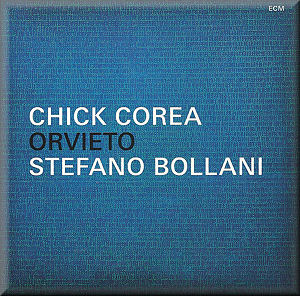Part 1
1. Orvieto Improvisation No. 1
2. Retrato Em Branco E Preto
3. If I Should Lose You
4. Doralice
5. Jitterbug Waltz
6. A Valsa Da Paula
Part 2
7. Orvieto Improvisation No. 2/Nardis
8. Este Seu Olhar
9 Darn That Dream
10. Tirititran
11. Armando's Rhumba
12. Blues in F
Chick Corea, Stefano Bollani - Pianos
Put two of my favourite pianists together and the result must be magic - right? Well, not entirely.
Chick Corea has plenty of experience of piano duets, as he has recorded
with such artists as Herbie Hancock, Hiromi, and Gonzalo Rubalcaba.
Yet piano duetting is a difficult process, as it necessitates each
musician fitting in with what the other player is doing. This applies
especially to free improvisations, like tracks 1 and 7 here, as the
lack of structure can lead to random tinkling instead of musical togetherness.
And the traditional Tirititran starts with the duettists tapping
the wood of the piano (pianists trying to be drummers?) before rhythmical
triple time.
Some pre-arranged structure is useful, so that the two pianists at least know the basis of what they are playing. A simple melody is probably best, as a tune like Fats Waller's Jitterbug Waltz is really too complicated to be an ideal choice. The final Blues in F would work better if each player took turns to predominate, instead of both of them seeking the limelight at the same time.
Retrato Em Branco E Preto works quite well, as it is based on a melody by Antonio Carlos Jobim. Jazz standards like If I Should Lose You and Darn That Dream also provide a helpful foundation, although Corea and Bollani obscure the latter by improvising on the chord sequence without actually stating the melody. But Doralice swings along cheerfully on a Latin-American pulse.
The duettists are not separated by stereo, but you can hear that Chick Corea usually leads the way, as his style is very distinctive. In addition to the improvisations, each pianist contributes a composition of his own. Stefano Bollani's A Valsa Da Paula has traces of Thelonious Monk, while Chick Corea's well-known Armando's Rhumba has a typically attractive Corean samba beat.
To sum up, this is a curate's egg of an album: excellent in parts.
The best parts are those where one pianist supplies the rhythm to
back up the other. The worst parts are the meanderings that result
when neither player manages to cohere with the other.
Tony Augarde
www.augardebooks.co.uk
